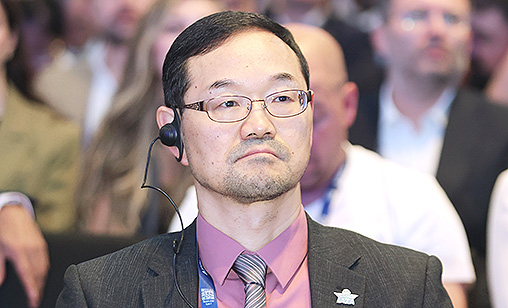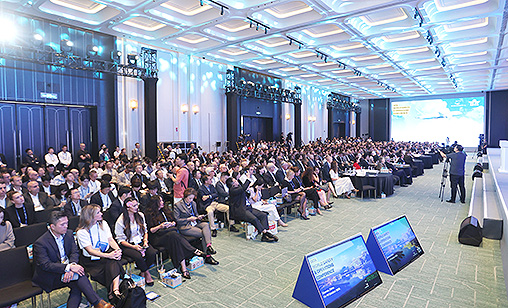Main Story
China Building post-pandemic aviation ties with global peers
October 1st 2025
This year, the International Air Transport Association (IATA) World Safety and Operations Conference (WSOC) was held in Xiamen and hosted by Xiamen Airlines. Read More » It was the first major IATA event held in the country since the pandemic and an important opportunity for China’s carriers, representatives of all three levels of the administration said.
This representation underlines the significance of the summit being held in China, IATA vice president North Asia, Dr Xie Xingquan, told Orient Aviation on the sidelines of WSOC.
 |
“Last year in Morocco, Xiamen Airlines bid at the tender to host the WSOC. Its presentation was very impressive, demonstrating commitment to sustainability, safety, openness and hospitality. So we wanted to come here and host WSOC,” he said. “Unfortunately for Shanghai, China Eastern Airlines missed the opportunity to host the AGM in 2022.
“In 2023, we relaxed COVID regulations in China, but there were still restrictive measures on passengers. This is the first time after COVID a Chinese airline has hosted an IATA global gathering,” Dr Xie said.
“We have welcomed more than 800 delegates and nearly 600 attendees came from overseas. That is indeed a platform for Chinese airlines, especially Xiamen Airlines, to display achievements, share knowledge and learn from the rest of the world.
“All of these factors are significant. Nobody regrets this choice. Some people are saying after Xiamen Airlines they will be under pressure to match this level of organization.”
Many Chinese attendees, including the IATA Team, say it is a symbolic signal that shows strong support for China’s recovery from the COVID crisis.
“This is not easy. Somehow it is a long journey. The top three airlines in China are still losing money. The good news is they have reduced the loss,” he said, “but they still suffer from intensive price competition.
“During COVID, at least for three years, Chinese airlines were separated from IATA global events.
“After COVID, IATA stopped providing the video channel to them to encourage people to come together in person.
“Xiamen Airlines is the first airline from China to join the Airline Retailing Program. They are an industry pioneer and very eager to adapt to new markets and embrace new technology,” he said.
On the first day of the WSOC, IATA highlighted three critical priorities for global aviation safety and operations.
They are defending and advancing global standards, using data to enhance performance and fostering a strong safety culture through leadership.
“But North Asia and the Asia-Pacific have their own pressing challenges,” Dr Xie said. “The two regions are slightly different.
“For North Asia, I highlight using data. It is what I am doing right now. I encourage Chinese airlines to contribute more to data, to share data and navigate the data with the global industry data pool.
“Chinese airlines move fast in smart aviation - digital transformation, leveraging data and gaining benefits from using the data for many things.
“That is good, but in terms of sharing data globally, when it refers to data cross-border transfer and data governance, they have concerns about regulatory compliance and global alignment.
 |
“One example is IATA Turbulence Aware. When we look at the live map, there is dense coverage in regions like Europe, the U.S., but the Mainland airspace is blank.
“So we lack coverage density. If you lack data coverage and the airlines don’t want to share data then this is an egg and chicken issue. The more data you contribute and share, the more valuable the data.
“For the Asia-Pacific, the biggest challenges are fragmented or inconsistent regulations or policies.
“Different countries, different regulations, rules and fragmented, patchwork regulations. So we increase the complexity of the compliance, increase the cost for airlines and manage to confuse passengers and air carriers in that region.
“For safety, it is the same. “Just as director general, Willie Walsh said, there is no competition on safety issues. We have to share, we have to harmonize, we have to unify the safety regulations and identify the minimum requirements to keep all the regulations consistent and easy to implement harmoniously.”
“There are several reasons why airlines might be hesitant about sharing data. They have a few concerns. Firstly, consent to data coverage density.
“In this aspect, the carriers might feel by sharing data, they give too much information about their own commercial operations.
“Secondly, it is cost and technical issues. For example, Turbulence Aware. It requires transmitting the data and transmitting the data is a cost burden.
“Fortunately, Boeing has committed to provide support free of charge, but only for 747s, 777s and 787s. Technically, it is possible and free of charge.
“But for Airbus, it is a problem. It is being worked on and very soon we will provide a solution for the aircraft fleet. So that is a technical issue.
“There are cost concerns. The first one is data governance. People care about data confidentiality, transparency and how much decision-making power they have.
“One way to mitigate the data governance issue is introducing a supervising governing body, composed of airlines, that will be looking for clearance from government structures to move forward,” Dr Xie said.
Just as hosting the WSOC in China was an opportunity for its industry to connect with the rest of the world their global peers had the opportunity to learn from China. “This lesson might be very valuable as the country is the global safety leader.
“Chinese airlines move very fast. The aviation market expanded at a very rapid pace. At the same time, its safety record was maintained very well.
“I am very proud of North Asia’s safety record. In 2024, the medium flight accident rate was 0.13, the lowest of all IATA regions. For the last three consecutive years, no fatality occurred. That is amazing.
“Willie Walsh himself said it is a cause for the rest of the world to learn from Chinese airlines and the CAAC as regulator in how to keep safe and remain safe while the market is growing exponentially, in fact neck in neck. Right now in the region, demand is jumping and the market is moving very fast.
“For the regulators, safety challenges are quite huge: how to smartly, efficiently and effectively manage the safety challenges.
The lessons from China’s regulations, or Chinese airline operations in terms of safety management, are strong leadership.
“We have our unique political system and culture. So aviation safety and security are top of other priorities and there is a duty to implement every word of the law and policies.
“If a safety audit leads to findings for actions, regulators and airlines take it seriously and follow up to correct them. We have very strong political will and we treat safety as non-negotiable.
“Another lesson is the proactive investment in infrastructure for passengers. In this part of the world, the scale of investment is huge. For almost three decades, China invested huge resources in its air traffic management system and modernized its airports and facilities at airports.
“To be honest, somehow we outpaced air traffic itself. I don’t know if we can keep up this investment pace, but it is definitely seen as the cornerstone of economic development and growth.
“So I think these are lessons the rest of the world can learn about Chinese aviation: strong leadership and safety culture and the aviation industry’s contribution to the economy for society and for the people themselves.”